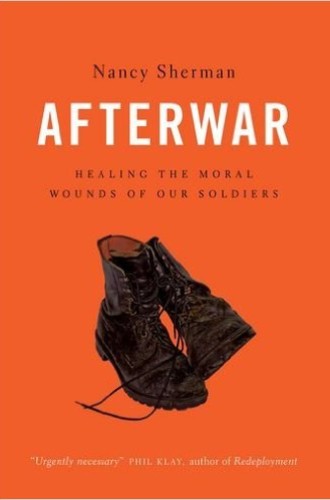Afterwar, by Nancy Sherman
"We are a part of the homecoming—we are implicated in their wars,” writes Nancy Sherman, one of the leading voices in the emerging discourse concerning military moral injury. Sherman seeks to mobilize a broad base of societal engagement with the postdeployment homecomings of our nation’s service members. The message of her book Afterwar is clear: society must understand the totality of human experiences of war, including its moral dimensions.
Afterwar is chiefly concerned with the moral wounds of war, which are coming to be called moral injury: the psychological, physiological, and spiritual consequences of having taken actions that transgressed and overwhelmed one’s moral standards and expectations. Moral injury can also be generated by more general conditions in which one’s sense of personal responsibility is activated, generating emotions such as shame, guilt, disgust, or rage.
Read our latest issue or browse back issues.
Sherman asserts that “moral wounds demand moral healing,” and her vision of moral repair is a relational one that necessitates interpersonal engagement. She criticizes superficial nationalistic gestures that celebrate the troops but fail to honor their complex experiences. She was inspired by spending time with veterans at Walter Reed Medical Center, and she sees herself as participating in a larger community of empathetic listeners. Sherman’s book does not consider the role of religious congregations, but her vision of engaged communities of empathy and hope would resonate with many church congregations.
Unfortunately, this book demonstrates two significant shortcomings in the literature on moral injury. First, like Jonathan Shay and Ed Tick, both widely cited in this field, Sherman relies on Greek mythology to explore moral injury. This move asserts that moral injury has been around a long time, but with so much immediate evidence to draw on, referencing the Greeks seems superfluous. This problem is even more pronounced when we consider the realities of modern warfare. The lack of clear battle lines and the ambiguity about who is an enemy combatant, for example, present moral challenges never faced by the cast of the Iliad.
A second limitation that pervades the discourse on military moral injury is acquiescence to the norms of medical diagnosis and treatment. Moral conflict and anguish are viewed as wounds or injuries in need of repair or healing. This line of response reinforces the assumptions that too often cast our nation’s veterans as victims of their experiences rather than as resilient survivors seeking to write new chapters of their lives. Sherman does not adequately problematize the medical paradigm.
It is necessary to reframe our assumptions about moral anguish. We must realize that the challenges and opportunities of these transitions between the military and civilian worlds are manifested in relationships. Veterans who cannot establish trustworthy and engaging relationships with others back home are likely to become socially isolated and vulnerable to harmful coping strategies. However, veterans who make connections, receive the benefit of others’ patience and persistence, and are able to take risks and find compassion are likely to find many sources of nourishment and opportunities to thrive.
Sherman’s book is critically important at this time for our nation. All of us have a role to play and all of us are needed. In October 2015, hundreds of veterans, military family members, health-care professionals, ministers, and other concerned citizens will gather in Kansas City for the first national conference on military moral injury and soul repair. Sherman’s voice is adding to the spirit of this growing movement.
The challenges of postdeployment reentry and reintegration are not merely mental health issues; we will continue to fail if we do nothing more than medicate moral anguish. We all can contribute to improving future outcomes for our nation’s veterans and their families.
Moral anguish generated during war is not solely the responsibility of our nation’s veterans; it is the burden of our nation as a whole. War is a supremely ugly and horrific undertaking, so to treat its costs only superficially is an act of cruelty. When civilians simply say “Thank you for your service” or avoid the matter altogether when speaking with veterans and military family members, we are refusing to acknowledge our shared culpability.
Our nation’s congregations have a unique and powerful role to play in postdeployment reentry and reintegration. Our traditions, scriptures, and sacramental practices, as well as the communities themselves, are vital resources for providing empathy and compassion, collaborating in service-based projects that reaffirm dignity and leadership capacities, and hearing the stories when people are ready to tell them. Military service involves loss of many kinds: the death or injury of loved ones, the loss of stability and consistent community relationships, and changing demands on families during different phases of the cycles of deployment. If our congregations could do one thing well that would make a significant difference in the lives of many veterans and military families, it would be in supporting the grief work that is needed for processing all these different kinds of loss.







